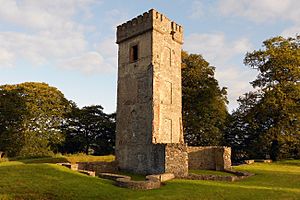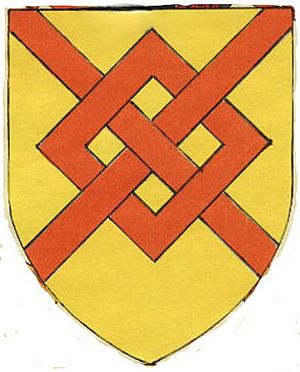Dún Dealgan Motte facts for kids
|
Móta Dhún Dealgan
|
|||||||||||

Byrne's Folly atop Dún Dealgan Motte
|
|||||||||||
| Alternative name | Cú Chulainn's Castle Castletown Motte Castletown Mount Byrne's Folly |
||||||||||
|---|---|---|---|---|---|---|---|---|---|---|---|
| Location | Castletown, Dundalk, County Louth, Ireland |
||||||||||
| Region | Castletown River Valley | ||||||||||
| Coordinates | 54°00′50″N 6°25′49″W / 54.013889°N 6.430278°W | ||||||||||
| Type | motte with castellated house | ||||||||||
| Area | 0.85 ha (2.1 acres) | ||||||||||
| Diameter | 43 metres (141 ft) (at summit) | ||||||||||
| Circumference | 135 metres (443 ft) (at summit) | ||||||||||
| Height | 10 metres (33 ft) | ||||||||||
| History | |||||||||||
| Builder | Bertram III de Verdun | ||||||||||
| Material | earth | ||||||||||
| Founded | late 12th century | ||||||||||
| Periods | Norman Ireland | ||||||||||
| Cultures | Cambro-Norman, Old English | ||||||||||
| Associated with | Normans | ||||||||||
| Site notes | |||||||||||
| Public access | yes | ||||||||||
| Designation |
|
||||||||||
Dún Dealgan Motte is an old earth mound, called a motte, located in Dundalk, Ireland. It is also a National Monument, which means it's a very important historical site protected by the country.
Contents
Where is Dún Dealgan Motte?
Dún Dealgan Motte is found just outside Dundalk. It sits on a hill overlooking the Castletown River. This spot was chosen because it was easy to defend and offered good views of the surrounding area.
History of Dún Dealgan Motte
Ancient Fort and Legends
Long ago, an ancient Irish fort, called a dún, stood here. Some old stories say this place is where the famous Irish hero Cú Chulainn was born. In the epic tale Táin Bó Cúailgne, Cú Chulainn uses this site as his main base.
Historical records, like the Annals of the Four Masters, mention a battle happening here around the year 500 AD. At first, the place was just called Dealga. The word dún was added after 1002, suggesting a new fort might have been built on the hill around that time. People also dug a special underground passage, called a souterrain, into the hill during this ancient Irish period. It was about 17 meters long and shaped like the letter Z.
Norman Castle Mound
After the Normans came to Ireland, they built a simple type of castle called a motte-and-bailey. This was a large mound of earth with a wooden fence (a palisade) and a tower on top. Dún Dealgan motte was likely built by a Norman knight named Bertram III de Verdun in the late 1100s. It also had a lower walled area, called a bailey, to the northwest.
This motte was an important stronghold for Hugh de Lacy, 1st Earl of Ulster in 1210. However, he had to leave it when King John chased him north. Later, in 1318, Dún Dealgan was the site of the Battle of Faughart. This battle was a big event that ended the campaign of Edward Bruce in Ireland, as he was defeated and died here.
Byrne's Folly
Much later, in the 1700s, a local landowner named Patrick Byrne started building a fancy Gothic-style house on top of the motte. People sometimes called him a "pirate" because he made a lot of money from smuggling.
His new house was damaged during the Irish Rebellion of 1798. After that, only a tower with castle-like features, known as "Byrne's Folly", remained.
In 1850, Thomas Vesey Dawson rebuilt the house as a country getaway. But it eventually fell apart again. The County Louth Archaeological and Historical Society bought it to turn it into a museum. Sadly, it was damaged even more during the period of fighting in Ireland between 1919 and 1923.



